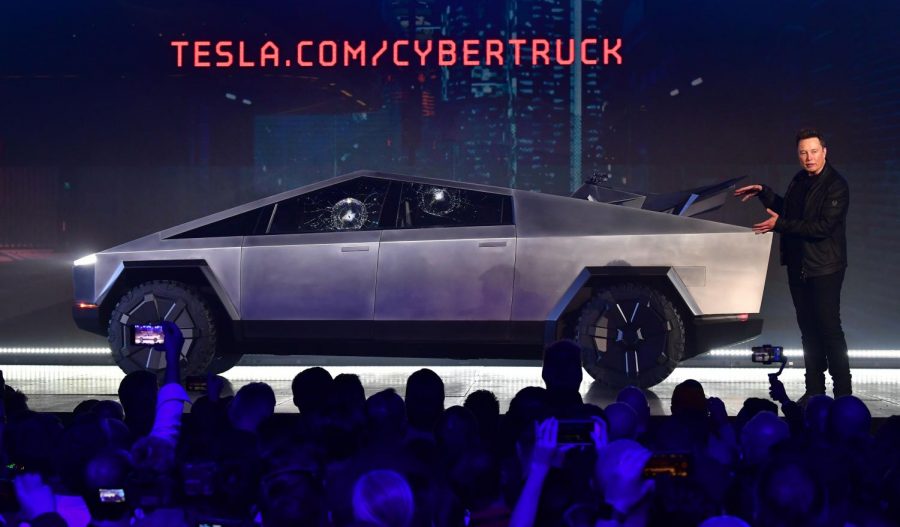Sustainable, But Not Sustainable Enough
Electric cars seem better for the environment, but come with many problems as well.
PHOTO | MCT Campus
Tesla co-founder and CEO Elon Musk gestures while wrapping up his presentation of the newly unveiled all-electric battery-powered Tesla Cybertruck at Tesla Design Center on Nov. 21, 2019 in Hawthorne, Calif.
“In order to have clean air in cities, you have to go electric,” Tesla founder Elon Musk said at a 2016 technology forum.
But that doesn’t necessarily reflect reality. Electric cars emit excessive amounts of carbon dioxide, in some cases more than diesel cars, and the production of the batteries that fuel electric cars have detrimental environmental effects as well.
Even the supposedly most revolutionary electric cars, like Tesla’s newest car, the Cybertruck, have heavy environmental concerns. The Cybertruck includes lithium-ion batteries and solar panels, which are both sources of clean energy, but is still charged through a “plugin,” in which the power will almost certainly come from fossil fuel burning powerplants since the majority of the United States uses fossil fuels are their primary source of energy. When the Cybertruck is officially released in 2021, those factories will still exist and will mostly power it.
It is commonly reported and known that electric cars are better for the environment because it emits less carbon dioxide through the burning of fossil fuels. However, this assertion is untrue under some circumstances. The Institute for Economic Research conducted a study measuring the carbon emissions of electric cars compared to diesel cars. The study found that, in Germany, electric cars actually emit more carbon than diesel cars because they get the majority of their energy through fossil fuels. This means that when electric cars are charged, huge amounts of carbon are still released, bringing further damage to the environment.
However, the amount of carbon dioxide that is released depends mostly on how “green” the country it charges in is. Carbon emissions are not always higher for electric cars. In countries like Belgium, for example, which gets energy mainly from renewable energy sources, carbon emissions from electric cars are three to four times lower than diesel cars, according to the European Union Fact Check.
Most countries, however, are primarily powered by fossil fuels, with the United States getting 81% of its energy from fossil fuels, according to The National Academics. The only difference in electric cars versus diesel cars is where the carbon emissions are coming from – the exhaust pipe in diesel cars and power plants from the charging of electric cars.
Another environmental concern about electric cars is the energy it takes to mine and produce the materials necessary for batteries in electric cars. The Tesla Model 3 emits 12 to 16 tons of carbon dioxide, according to European Union Fact Check– an excessive amount in itself.
In addition, mining materials like lithium uses large amounts of water- approximately 500,000 gallons of water per ton of lithium mined, according to Wired UK.
Lithium also requires chemicals like hydrochloric acid to be used in the production process, and many others are released into the water stream as runoff. Research in Nevada found effects on this fish in their streams over 150 miles from lithium battery factories. Even if electric cars generally do emit less carbon, other forms of pollution must be considered.
Though electric cars do provide benefits in some countries, it’s important not to overestimate the effect it will have on the environment, especially when they still emit tons of carbon every year. Until countries begin to rely more on renewable energy, not much can be done to improve the carbon emissions from cars, though electric cars are a step in the right direction.



